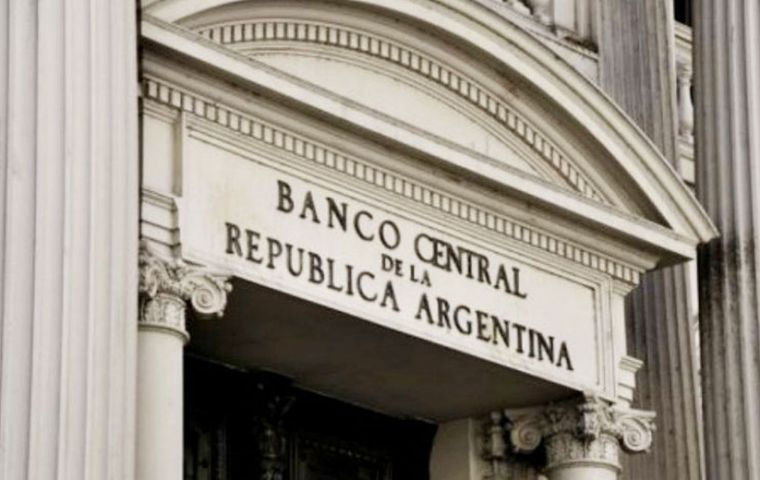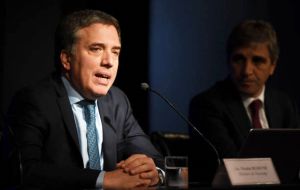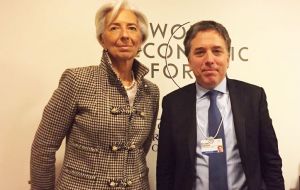MercoPress. South Atlantic News Agency
Argentina hikes benchmark rate to 40%, easing pressure on the Peso but not on inflation
 Analysts said the move suggested the Central Bank had done enough for now to stabilize the peso.
Analysts said the move suggested the Central Bank had done enough for now to stabilize the peso.  The government also said it was lowering its primary fiscal deficit target for 2018 from 3.2% to 2.7%, Treasury Minister Nicolas Dujovne said.
The government also said it was lowering its primary fiscal deficit target for 2018 from 3.2% to 2.7%, Treasury Minister Nicolas Dujovne said.  Following the decision, the peso -- which has lost more than 10% of its value in the past month -- opened 6% higher against the dollar.
Following the decision, the peso -- which has lost more than 10% of its value in the past month -- opened 6% higher against the dollar.  The Central Bank also ratified an inflation target of 15% for 2018, although the IMF has projected it will reach 19% and private consulting firms, 20%.
The Central Bank also ratified an inflation target of 15% for 2018, although the IMF has projected it will reach 19% and private consulting firms, 20%. Argentina's Central Bank on Friday hiked its benchmark interest rate to 40% to support the peso, the third such hike in just over a week and one day after the currency plunged in value. Following the decision, the peso -- which has lost more than 10% of its value in the past month -- opened 6% higher against the dollar.
Although it has since given up some of those gains, analysts said the move suggested the Central Bank had done enough for now to stabilize the peso.
The government also said it was lowering its primary fiscal deficit target for 2018 from 3.2% to 2.7%, Treasury Minister Nicolas Dujovne said.
The bank had raised its key rate to 33.25% on Thursday, but that failed to prevent the peso tumbling 7.64% on one of the most tense days for the government of President Mauricio Macri. It was the third such hike in just over a week. The first hike was on April 27, when the Central Bank raised the rate to 30.25% to ease pressure on the national currency.
Like other emerging market currencies, the peso has been buffeted by a rise in US government bond yields encouraging investors to buy US treasury bonds.
Friday's interest rate hike, “the third emergency hike in a week, finally seems to have brought some support to the currency,” Capital Economics research group said, suggesting that the bank had “probably done enough for now to stem the tide.”
A traumatic history of hyperinflation, financial crises and bank runs in Latin America's third-largest economy has prompted Argentines to try to buy dollars to protect their savings when financial troubles arise, complicating the Central Bank's efforts to prop up the peso.
Inflation remains a problem. In the first three months of the year, the cost of living rose 6.7%, according to Indec, the official statistics agency. Dujovne acknowledged that high interest rates could impact on growth.
“We hope that this hike in the base rate will be as short as possible,” he said on Friday.
But Capital Economics said it was likely that interest rates would need to stay at emergency levels “for a prolonged period.”
“In Argentina, we expect rates will need to remain higher for longer to tackle the entrenched inflation problem. And if the central bank loosens policy prematurely, it could risk triggering a re-run of the current crisis.”
Argentina's economy grew 2.8% in 2017, and the government is aiming for 3.5% this year.
The Central Bank also ratified an inflation target of 15% for 2018, although the IMF has projected it will reach 19% and private consulting firms see it reaching 20%.
“The inflation target is not going to change,” Dujovne said, outlining a longer-term outlook of 10% in 2019, and 5.0% in 2020.
But analysts believe the dollar's climb against the peso will put pressure on prices, thereby complicating efforts to meet the government's inflation targets.




Top Comments
Disclaimer & comment rules-

-

-

Read all comments@EM
May 06th, 2018 - 02:19 pm +1You'd like to see Macri gone ASAP, right? If the congress could find some way to get him out immediately and replace him with someone better for the economy, wouldn't that be a good thing to do?
“The Central Bank also ratified an inflation target of 15% for 2018, although the IMF has projected it will reach 19% and private consulting firms see it reaching 20%.”
May 05th, 2018 - 07:01 pm 0This information alone shows a government in deep denial of what's developing under their nose.
Does minister Dujovne really believes inflation in 2018 will be just 15 per cent when the first fourth months and every single analyst point to higher numbers?
Additionally, the measures announced to stop the recent stampede are nothing but short-term patches that address the financial side but fail to address the real economy--the only able to provide a foundation for financial stability.
@DT
May 06th, 2018 - 04:03 pm 0Excellent question. Watching from afar still another calamity abating on my home country is painful.
Long before the November 2015 election, I was concerned about what Mauricio Macri would do to Argentina as president. However, I would've preferred that my concerns had revealed baseless.
The country's economy is rapidly deteriorating, and a main concern at this point is that a collapse is avoided -- no matter who is at the helm.
Macri and his team still have an opportunity to get out of their ivory tower and take a realistic view of the situation they have arrived to.
Before time runs out, they could urgently call in all the country’s economic, social and political sectors and attempt to reach a national agreement on the necessary measures to revert the current course.
If they do it, the strain on Argentina’s 44-million population will still be enormous -- If they don't, the consequences are unpredictable. It’s not worth to blindly keep the current course of action just to protect the privileges of 1,000 families.
Commenting for this story is now closed.
If you have a Facebook account, become a fan and comment on our Facebook Page!